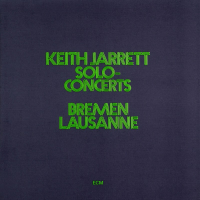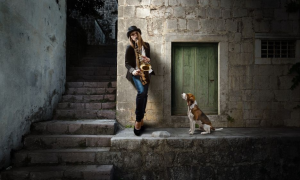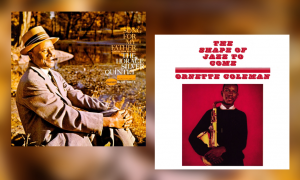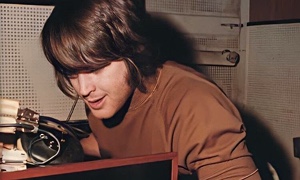Home » Jazz Articles » Building a Jazz Library » Ten Essential Keith Jarrett Solo Recordings
Ten Essential Keith Jarrett Solo Recordings

Courtesy Steven Sussman
In addition to his two trios, Jarrett has also been a member of several notable groups, including the Charles Lloyd Quartet, and the Miles Davis Quintet. He swam against the current with some peculiar albums such as Death And The Flower (ABC Impulse!, 1975), Mysteries (Impulse!, 1976), Spirits (ECM, 1985), and Dark Intervals (ECM, 1988). Jarrett occasionally worked in the broader keyboard family, recording albums on organ, harpsichord, electric piano, and clavichord. At times he has recorded playing flute, soprano saxophone, electric guitar, bass, tabla, and drums.
Jarrett is best known for his solo piano performances, which have earned him a devoted following of fans, and a catalog that will remain popular despite the pianist's forced retirement. And Jarrett's portfolio is likely to grow as tapes of live performances surface at a fairly regular clip. Dramaten Theater Stockholm, September 1972 (Restauración 2023), for example, is a rare non-ECM solo concert with all the fire and improvising genius of Jarrett's early masterpieces. The selections that follow are all on the ECM label and are chosen based more on diversity than ranking in the Jarrett solo hierarchy.
 Solo Concerts: Bremen/Lausanne (1973)
Solo Concerts: Bremen/Lausanne (1973) Solo Concerts: Bremen/Lausanne was the first live solo recording released on the ECM label. The two concerts featured on the album demonstrate Jarrett's unique improvisational style, combining elements of jazz, folk, classical, and gospel. The album features two long-form tracks, each clocking in at over forty minutes. The first, recorded in Bremen, Germany, is a mesmerizing, expressive journey through the improvisational depths of Jarrett's musical genius. The second, recorded in Lausanne, Switzerland, is a more upbeat, often playful style. Both performances were an early display of Jarrett's exemplary musicianship and technical skill and are essential listens.
 Köln Concert (1975)
Köln Concert (1975) A few pundits have been quick to point out the numerous flaws of the Köln Concert. Yes, it was a beat-up rehearsal piano, slightly out of tune, with a nonfunctional sustain pedal, and Jarrett, in a back brace, was exhausted and irritated. Yet, almost fifty years later, it remains the best-selling solo album in jazz history and the best-selling piano album of all time. The glittering, slowly advancing melody that kicked off the half-hour-long "Part I" would give way to a hypersonic array of hooks and busy phrases incorporating a half-dozen distinct styles and genres. With the mesmerizing Köln Concert, improvised solo-piano performance would become synonymous with Jarrett's name.
 Sun Bear Concerts (1978)
Sun Bear Concerts (1978) The Sun Bear Concerts is as comprehensive a collection of solo Jarrett as most listeners would ever need. Originally a ten-disc vinyl box set, it later appeared as a six-disc CD box. Recorded in a number of Japanese venues in 1976, it features seven hours of virtuoso performances. Like all of Jarrett's ECM solo recordings, the vast majority of this collection is spontaneous, with the exception of encores. Little of the Sun Bear Concerts features the aimless wandering that can sporadically accompany Jarrett's impulsive creations. The box set is a substantial investment but worth it even for non-jazz fans.
 Dmitri Shostakovich: 24 Preludes and Fugues op.87 (1992)
Dmitri Shostakovich: 24 Preludes and Fugues op.87 (1992) Some purest prefer that artists stay in their lane. That is particularly true when your reputation is that of a great jazz virtuoso and a controversial personality. Dmitri Shostakovich: 24 Preludes and Fugues op.87 already had a "gold standard" in a Grammy-winning recording of the same title (Melodiya, 1962) from Tatyana Nikolaieva, opening Jarrett to comparisons. The pianist, however, studied classical piano at the Philadelphia Conservatory of Music, and has sixteen impressive recordings covering Bach, Mozart, Handel, Bartók, G.I. Gurdjieff, Samuel Barber, and Arvo Pärt.
When Jarrett works in the classical genre, he scrupulously avoids making the interpretations his own. In doing so, we hear another side of his superb musicianship. Many classical fans have praised Jarrett's Dmitri Shostakovich: 24 Preludes and Fugues op.87 as the cleanest, most heartfelt take on the Russian composer/pianist's celebrated work.
 Rio (2011)
Rio (2011) The live, spontaneously improvised Rio was not only Jarrett's personal best at the time but also flawless documentation of Jarrett's scope and understanding of composition and presentation. With fifteen compact pieces, the pianist has the opportunity to vary the program's styles to a greater extent than with some of his more epic-length solo works.
The opening "Part I" generates a sense that Rio is going down a somewhat familiar path of darker abstract intellectualism. That is not to say that the song is in any way unappealing; like all the pieces in this collection, it has an emotional undercurrent that makes it highly engaging. The mood alters significantly with "Part II," a soulful piece that is more generally representative of the tempo that dominates much of the concert. The collection is also sprinkled with bits of straight-ahead jazz, ballads, and Latin influences, with "Part V" representing some of Jarrett's recognizable gospel influence. Jarrett's shape-shifting abilities and the broad expanse of styles are only references; it is his exceptionality that gives the music its essence and soul. What is most evident in this collection is that Jarrett is enjoying the music more than in quite some time, and it energizes both him and the audience. Rio is a work of unsurpassed energy, beauty, and creativity.
 Creation (2015)
Creation (2015) Jarrett served as Producer (with Manfred Eicher in the Executive Producer role) and sequenced the program drawing on a non-sequential series of performances from Tokyo, Toronto, Paris and Rome, all from concerts of the period. The "virtual" concert—sans applause—that he has created is steeped in lyricism by virtue of the pieces he has selected. The two things that make this paradigm distinctive are the almost seamless flow that imparts organic movement and the absence of pointed punctuation that infuses much of Jarrett's improvised solo work. As a result, Creation is closer to his G.I. Gurdjieff: Sacred Hymns (1980) than it is to The Köln Concert (1975).
The improvised compositions, sequentially numbered Parts I through IX are, to a large extent, reflective and ruminating. It is not until "Part V" that Jarrett hints at spirituality if not his full-blown rollicking gospel style. There is plenty of classical influence sprinkled throughout and particularly in "Part VII" but quiet lyricism is the pervading temperament. Though Creation is meditative there is real power in Jarrett's characteristic and consummate capacity to spontaneously compose improvised music and then move it to a new space.
 A Multitude of Angels (2016)
A Multitude of Angels (2016) In the last solo concert tour of the first half of Keith Jarrett's career, the preeminent pianist of our time had, himself, recorded the performances across four Italian locations, on his digital audio tape machine. These would be the final public performances Jarrett would give for a number of years as he worked through chronic fatigue syndrome. On a concert timeline, A Multitude of Angels follows the 1995 performances captured on La Scala (ECM, 1997) but with an unexplained twenty-year delay until release.
Describing Jarrett's long-form improvisations, other than in broad terms, is an impractical undertaking. There are the familiar elements of his repertoire—the rollicking, gospel feel of "Modena, Part I" that opens Disc 1 and takes on an elegiac quality near its half-hour mark. It is classic Jarrett. In contrast, there is "Genova, Part I." Abstract and angular, Jarrett abandons a melody for thirty-one minutes of technique, something few musicians could make this compelling. Jarrett has organized the tracks in a logical and attention-holding manner. "Ferrara, Part I" is introspective to the point that one can almost hear Jarrett's trepidation entangling with his determination; the latter winning out in the end as he exuberantly frees himself. This collection would be a necessity if only because it will be the last of its kind from that era but moreover, it is as cathartic a collection for listeners as it apparently has been for Jarrett.
 Munich 2016 (2019)
Munich 2016 (2019) The second coming of Keith Jarrett—post-chronic fatigue syndrome—was well behind him by the time he performed in Munich, Germany in 2016. The piano prodigy is captured in ECM's hometown at a Philharmonic Hall solo concert at the end of his European tour. His improvisational skills are in top form, across twelve extemporaneous compositions and three encores, on the two-disc set.
For this recording, Jarrett broke with his frequent practice of live improvisations that traversed one or two complete sets. Here he creates what ECM's liner notes refer to as a spontaneous "suite." In listening, it isn't obvious that the sequence has such a purposeful goal, but that's of little real consequence. All the familiar Jarrett motifs and themes are here. Munich 2016 devotes considerable space to free improvisations such as the thirteen-minute "Part I," the brief, fast-paced "Part VII," and "Part XI." Jarrett creates a thoughtful avant-garde piece with "Part X," gospel, on the moving "Part III," blues on"Part IV" and the rollicking boogie-woogie of "Part IX." His unique gift for creating pastoral lyricism in real-time is on display in "Part V" and "Part VII." The improviser's diversity and unrelenting inventiveness are stunning.
 J.S. Bach: The Well-Tempered Clavier—Book I (2019)
J.S. Bach: The Well-Tempered Clavier—Book I (2019) Jarrett and Johann Sebastian Bach go back a long way. Between 1722 and 1742, Bach composed two sets of preludes and fugues in all twenty-four major and minor keys, written for keyboard; the clavier was—at that time—a broad description taking in the harpsichord, clavichord, and organ. The Well-Tempered Clavier—Book I is a live version of Jarrett's 1988 ECM studio release of the same name. He followed with Book II (2000), another in a series of six Bach recordings.
Jarrett's reading of Bach's compositions is crystalline, and without embellishment. As he has said often of his interpretations of classical masters, the composer's music speaks for itself and requires no help on his part. Just the same, it is the pianist who brings this music to life. Jarrett's perfect pitch and technical skills overcome the challenge of taking music written for harpsichord and containing it within its intended perimeters, using the piano. He channels Bach through each of the forty-seven pieces, the only shading coming from the subtleties of the keyboard.
 Bordeaux Concert (2022)
Bordeaux Concert (2022) Recorded at the Bordeaux National Opera House, in July 2016, Bordeaux Concert marks Keith Jarrett's final solo performance in France. The improvised suite came from a prolific European tour that has produced three ECM releases to date. The album demonstrates that, even as Jarrett aged and cultivated his repertoire, he never let intellect overpower spontaneity.
Bordeaux Concert, like all the pianist's solo outings, is a voyage of discovery. In comparison to Jarrett's other 2016 ECM tour releases, Munich 2016 (2019) and Budapest Concert (2020), Bordeaux Concert stands apart in its exquisiteness. The album has its share of restive improvisations such as the opening atonal sequence of "Part I" and "Part II" with a frenzied baroque flavor. "Part VIII" is vintage Jarrett blues from the front pew. Aside from these more frenetic pieces, "Part III," "Part VI," "Part IX," "Part XI" and "Part XII," are reminders of Jarrett's inimitable ability to pull a beautiful melody from the ether.
Tags
PREVIOUS / NEXT
Support All About Jazz
 All About Jazz has been a pillar of jazz since 1995, championing it as an art form and, more importantly, supporting the musicians who make it. Our enduring commitment has made "AAJ" one of the most culturally important websites of its kind, read by hundreds of thousands of fans, musicians and industry figures every month.
All About Jazz has been a pillar of jazz since 1995, championing it as an art form and, more importantly, supporting the musicians who make it. Our enduring commitment has made "AAJ" one of the most culturally important websites of its kind, read by hundreds of thousands of fans, musicians and industry figures every month.
























